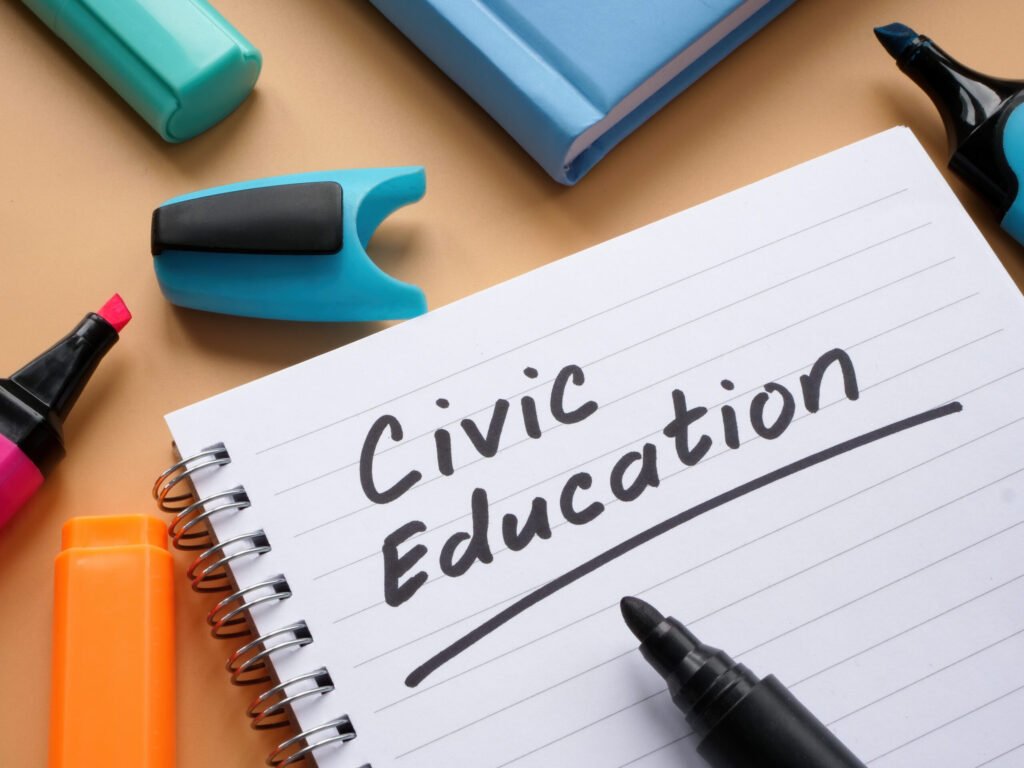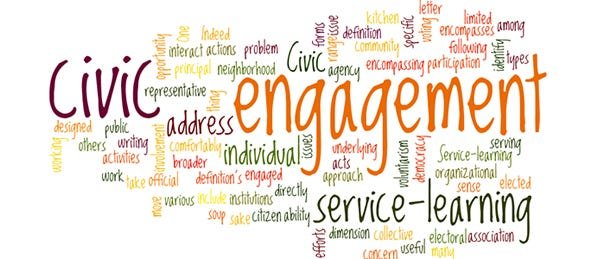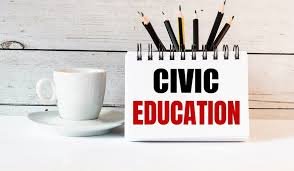Introduction
Civic education is not just about understanding how government works—it’s about preparing young people to actively and responsibly participate in society. With global democracies facing increasing challenges such as political apathy, disinformation, and low voter turnout, the importance of civic education for youth cannot be overstated. By equipping students with knowledge, skills, and values, civic education lays the foundation for meaningful real-world engagement.
What Is Civic Education?

Definition and Scope
Civic education is the process of teaching individuals their rights, responsibilities, and roles within a democratic society. It includes instruction in government systems, legal processes, civic duties, and ethical participation in community and national life. The goal is to create informed, responsible, and active citizens.
Where It Happens
Civic education takes place in various environments—schools, community programs, family settings, and even through media. While formal education often introduces structured civics curricula, informal learning through community involvement and lived experiences also plays a vital role.
Why Civic Education Matters for Youth

1. Promotes Political Literacy
Civic education gives young people a clear understanding of political institutions, voting systems, and public policies. When students grasp how decisions are made in government, they are more likely to vote, follow news developments, and participate in the political process.
2. Builds Critical Thinking Skills
Students learn to evaluate information sources, distinguish between fact and opinion, and consider different viewpoints. These skills are essential in an age of social media, where misinformation spreads quickly and opinions are often polarized.
3. Fosters Community Engagement
Civic education encourages students to become involved in local issues. Whether it’s volunteering, participating in school councils, or organizing events, such activities help students see themselves as agents of change in their communities.
4. Teaches Civil Discourse and Respect
One of the most important aspects of civic education is learning how to engage in respectful dialogue. Students are taught to listen actively, respond thoughtfully, and value different perspectives—critical components of a healthy democracy.
5. Reinforces Civic Responsibilities
From voting and staying informed to obeying laws and serving on juries, civic education instills a strong sense of responsibility. Youth begin to see civic duties as essential parts of being a contributing member of society.
Also Read : Unlocking Higher Education Opportunities: A Guide For Aspiring Students
Key Components of Civic Education
1. Knowledge of Government and Law
A strong civic education program includes instruction in:
- The Constitution and Bill of Rights
- Separation of powers and checks and balances
- The roles of federal, state, and local governments
- Election processes and political systems
- Legal rights and responsibilities
2. Skills for Civic Participation
In addition to theoretical knowledge, students develop practical skills such as:
- Researching public issues
- Engaging in structured debates
- Writing petitions and policy proposals
- Public speaking and communication
- Organizing and participating in civic activities
3. Attitudes and Values
Civic education also focuses on values that support democratic life, including:
- Respect for others and the rule of law
- Tolerance and open-mindedness
- Community service and volunteerism
- Social justice and equality
- Responsibility and accountability
Also Read : STEM Education Programs: Inspiring Creativity And Critical Thinking
Real-World Applications of Civic Education

1. Youth Voting and Political Engagement
Studies show that students exposed to strong civic education are more likely to register to vote and participate in elections. They are also more inclined to stay politically informed and express their views through legal channels like protests or advocacy campaigns.
2. Involvement in Community Development
Civically educated youth often become involved in community initiatives—like food drives, environmental clean-ups, or youth councils. These activities foster leadership, teamwork, and a sense of ownership over community well-being.
3. Critical Awareness in the Digital Age
Civic education helps students navigate digital spaces with discernment. They learn how to recognize bias, fact-check information, and engage constructively on social media—skills that are vital in today’s information landscape.
4. Career Preparedness and Public Leadership
Understanding how systems work gives students an edge in careers related to law, public policy, education, and non-profit work. It also lays the groundwork for future leaders who want to run for office or advocate for change.
Also Read : What Are The Best Study Techniques For Effective Learning?
Challenges to Civic Education
1. Curriculum Gaps
In many regions, civic education is not given priority in school curricula. As a result, students may graduate with minimal understanding of democratic processes or civic duties.
2. Lack of Teacher Training
Educators may not feel adequately prepared to teach civics, especially when navigating politically sensitive issues. Professional development is crucial for building teacher confidence and competence.
3. Political Polarization
The current polarized climate can make civic education seem controversial. It’s essential to foster nonpartisan, inclusive spaces where students can learn about diverse viewpoints without fear or bias.
4. Inequitable Access
Students from under-resourced schools may receive limited civic instruction, perpetuating gaps in political participation and engagement. Ensuring equal access to civic education is a matter of educational equity.
Also Read : What Facilities Are Typically Available On A University Campus?
How Educators Can Promote Civic Engagement
1. Use Current Events
Incorporate news stories and policy debates into classroom discussions to help students connect civics with real life.
2. Encourage Student Voice
Allow students to explore issues that matter to them and express their opinions through class projects, essays, or forums.
3. Create Experiential Learning Opportunities
Simulations like mock elections, courtroom role plays, or model UNs allow students to experience government and civic processes firsthand.
4. Partner With Community Organizations
Invite local leaders or activists into the classroom to speak with students or create partnerships for service learning.
5. Make Civic Education Inclusive
Ensure that all students—regardless of background—see themselves represented in civic narratives and are empowered to participate.
Also Read : Gen Z Education: Bridging The Gap Between Traditional And Modern Learning
Conclusion
Civic education is a cornerstone of democracy. By preparing youth to engage with society thoughtfully and actively, it contributes to a healthier, more inclusive civic life. Whether through understanding how laws are made, learning to debate with respect, or volunteering in their neighborhoods, students gain tools that last a lifetime. In a world facing rapid social and political changes, civic education helps youth not only understand the world—but shape it.
FAQs
What age should civic education start?
Civic education can begin as early as elementary school with basic concepts like rules, fairness, and community. More complex ideas about government and citizenship can be introduced in middle and high school.
Is civic education only about politics?
No. While it includes political systems, civic education also covers community service, media literacy, public speaking, civil rights, and social responsibility.
Can civic education reduce political apathy?
Yes. When students feel informed and empowered, they are more likely to participate in civic life, vote, and engage in public discussions.
How can parents support civic education?
Parents can talk about current events, encourage volunteering, model respectful debate, and involve their children in community activities.
Are there tools or programs to help teach civic education?
Yes. Programs like iCivics, Generation Citizen, and the Center for Civic Education offer free resources, lesson plans, and interactive tools for educators and students.





